| français | English | Cymraeg |
|---|---|---|
| le ragoût; | stew | stiw; lobsgóws |
| (faire) mijoter; cuire en ragoût | to stew | stiwio; mud-ferwi |
| le ragoût de mouton | Irish stew | lobsgóws; cawl; pwt y berw |
| le pot-au-feu | beef stew | stiw eidion |
| le navarin d’agneau | lamb stew | stiw oen |
| le civet de cheveuil | venison stew | stiw fenswn/feneiswn |
| le ragoût de légumes | vegetable stew | stiw llysiau |
| ça m’a rien donner | I have nothing to show for it | nid oedd gennyf ddim i’w ddangos er |
| ça a fait tilt | the penny dropped | syrthiodd y geiniog |
| épeler | to spell (aloud) | sillafu |
| écrire; orthographier | to spell (in writing) | sillafu |
| la zone humide la terre humide |
wetland | tir gwlyb; cors; corstir; tir corsiog |
| la tourbière | bog (wetland) | cors |
| la tourbière | peat bog | mawnog; mawndir |
| la tourbe | peat | mawn |
| trotter | to trot | tuthio; trotian; trotio |
| trotteur | trotter | tuthiwr; trotiwr |
Category: Welsh (Cymraeg)
Poor mean houses
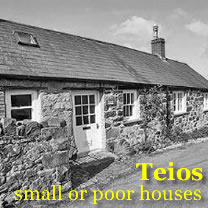
On the bus to Conwy today I noticed that the Welsh name of one of the stops included the word teios, which I hadn’t come across before. In English the stop had the word cottages in it.
I wrote down what I thought I heard and saw: teilios, but couldn’t find that in any Welsh dictionary. When I looked for cottages however I found the word teios, which is a combination of tai (plural of tŷ, house) and the diminutive ending -os, which was most commonly-used in North Wales (in the 18th and 19th centuries), but spread to the rest of Wales, according to the Geiriadur Prifysgol Cymru.
Translations of teios include small or poor houses; poor mean houses; and mean pitiful houses.
Some of the buses round here have a screen at the front that shows the name of the next stop in Welsh and English, and there are recorded announcements in both languages as well. The English announcements were recorded by someone with an English accent who mispronounces the Welsh names – he gets the consonants more or less right, but the vowels are often slightly off, and the stress is sometimes in the wrong place. I don’t know why they didn’t ask the guy who does the Welsh announcements to do the English ones as well.
When I hear a language or words pronounced in unusual ways it tends to grate a bit on my ears, just as out-of-tune singing or musical instruments do. There’s nothing wrong with foreign accents, but sometimes they can make comprehension more difficult. I try to speak languages (and sing and play instruments) as in tune as possibly. Do you?
Súilíní
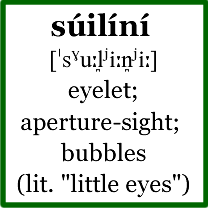
I discovered an interesting word in Irish yesterday – súilíní [ˈsˠuːl̪ʲiːn̪ʲiː] – which is a diminutive form of súil [sˠuːl̪ʲ] (eye) and means literally “small eyes”, and actually means eyelets, an aperture-sight, or bubbles. For example, uisce gan súilíní is still water (“water without bubbles”) [source].
More common Irish words for bubbles are bolgán and boilgeog.
The word súilíní is also used in Hiberno-English to mean “bubbles of fat floating on top of a stew or clear soup”, and is also written sooleens [source].
The word súil (eye) comes from *sūli, an alteration of the Proto-Celtic *sūle (suns), the dual of *sūlos, which is the genitive of *sāwol (sun), from the Proto-Indo-European *sóh₂wl̥ (sun). Apparently in Irish mythology the sun was seen as the “eye of the sky”, and the word for sun came to mean eye [source].
The words for sun in other European languages come from the same root, and most start with s, e.g. saũle (Latvian), sol (Swedish, Danish, Norwegian, Catalan, Spanish, Portuguese), Sonne (German), etc. There are some exceptions though, including haul (Welsh) heol (Breton), howl (Cornish) and ήλιος (ḗlios – Greek) [source].
Telyn newydd / New Harp
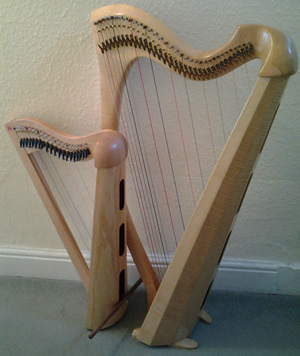
Mae fy nhelyn newydd wedi cyrraedd y bore ‘ma. Telyn efo 34 tannau o’r enw Ossian Clarsach< gan Tim Hampson ydy hi.
Pan ro’n i yn Plymouth dwy wythnos yn ôl yn ymweld â fy chwaer, mi es i i Bere Ferrers, nid mor bell o Plymouth, i gwrdd â Tim Hampson ac i weld y delyn. Mae o’n gwneud atgynhyrchiadau o delynau hanesyddol, ac yn atgyweirio telynau hefyd, ac roedd hi’n ddiddorol iawn gweld ei weithdy ac sut mae o’n gwneud telynau. Mae’r delyn Ossian wedi ei seilio ar delynau y 1930au a 1940au gwneud gan Henry Briggs yn Glasgow. Dw i wedi canu hi am oriau heddiw yn barod, ac mae hi’n swnio yn wych, ac yn edrych yn wych hefyd.
Yn y ffoto mae fy nhelyn newydd, a fy nhelyn bach y brynes i y llynedd.
My new harp arrived this morning. It’s a 34 string Ossian Clarsach made by Tim Hampson.
While I was in Plymouth visiting my sister a few weeks ago, I went to to Bere Ferrers, not far from Plymouth, to meet Tim Hampson and to see the harp. He makes reproductions of historical harps, and repairs and services harps as well, and it was fascinating to see his workshop and how he makes harps. The Ossian harp is based on harps made in the 1930s and 1940s by Henry Briggs in Glasgow. I’ve already played it for several hours today, and it sounds wonderful, and looks good too.
The photo shows my new harp with my little lap harp, which I got last year.
Les mot de la semaine
| français | English | Cymraeg |
|---|---|---|
| l’étui (m) à lunettes | glasses/spectacle case | blwch/castan/cas sbectol |
| la bannière Web | web banner | baner we |
| le budget | budget | cyllideb |
| le découvert budgétaire | budget deficit | diffyg cyllidebol |
| le découvert | overdraft | gorddrafft gorgodiad dyled cyfrif |
| à découvert | in the red | yn y coch |
| promouvoir | to promote | dyrchafu rhoi dyrchafiad |
| être promu(e) | to be promoted | cael dyrchafiad |
| le syndiact | trade/labour union | undeb |
| l’épingle (f) | pin (sewing) | pin |
| l’épingle de nourrice | safety pin | pin cau pin dwbl |
| la punaise | drawing pin | pin bawd pin gwasgu pin pen fflat |
| la broche | pin (medical) | pin |
| le papier bulle | bubble wrap | pecyn/papur swigen (?) |
| (la cérémonie de) remise des diplômes | graduation ceremony | cyflwyniad graddau |
| DAB (le distributeur automatique de billets) GAB (le guichet automatique de billets) le guichet automatique (Québec) le bancomat (Suisse) |
ATM cash machine cashpoint hole in the wall |
peiriant arian parod twll yn y wal |
Coasts and competitors
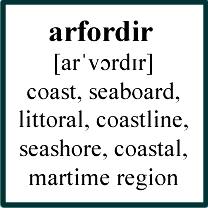
Sometimes when I see new words in English or other languages I can immediately break them down into their component parts and work out their roots, but other times I just accept words as whole entities without trying to work out their derivation.
One such word in Welsh is arfordir, which I hadn’t tried to analyse before. Last weekend, however, I was explaining some Welsh words to a friend who recently moved to Cardiff and who wants to learn Welsh, so I was in the right frame of mind, and the probable etymology of that word jumped out at me – ar (on, by) + môr (sea) + tir (land), so it’s “land by the sea” or the coast. This is correct, according to the Geiriadur Prifysgol Cymru.
Another etymology I discovered today is the word competitor, which comes from the Middle French compétiteur (rival, competitor), from the Latin competītor (rival, competitor, adversary, opponent; plaintiff), from con (with) and petītor (seeker, striver, applicant, candidate, claimant, plaintiff, suitor, wooer).
Petītor comes from petere (to make, seek, aim at, desire, beg, beseech), from the Proto-Indo-European *peth₂- (to fall, fly), which is also the root of the English word petition, and the Spanish word pedir (to ask for) [source]
Les mots de la semaine
| français | English | Cymraeg |
|---|---|---|
| le fossoyeur | gravedigger | torrwr beddau |
| la fosse | pit; grave | pwll; twll; bedd |
| le fossé | ditch; gap | ffos; twll |
| la fosse d’orchestre | orchestra pit | pwll cerddorfa |
| la fosse septique | septic tank | tanc carthion |
| le canot de sauvetage | lifeboat | bad achub |
| l’aube (f) | dawn | gwawr |
| le lave-vaiselle | dishwasher (machine) | peiriant golchi llestri |
| le plongeur | dishwasher (person) | golchwr llestri |
| les couvertures et draps; la parure de lit; la literie |
bedclothes; bedding | dillad gwely; gwellt gwely; gwelltach |
| la vipère (péliade) | (common) adder (vipera berus) |
gwiber |
Suo Gân
We are learning the traditional Welsh lullaby Suo Gân [sɨɔ ɡɑːn] in one of the choirs I sing in at the moment. It’s a lovely song that was first written down in 1800, but was probably composed around before then.
When I first saw the words Suo Gân I thought they might be Mandarin Chinese – I knew that gân is mutated version of the Welsh word for song, cân, but suo doesn’t look like Welsh. In fact suo is a variant spelling of sïo, which means “to hum, whizz or murmur”, so suo gân could be translated as “humming / murmured song”.
Here’s a recording of Bryn Terfel singing this song:
The words suo [suɔ] and gan [kan] have many meanings in Chinese, but there are only a couple of expressions I can find that combine both of them:
– 锁杆 [鎖桿] (suǒgǎn) = locking bar
– 所感 (suǒgǎn) = one’s impression of something
Polyglot Gathering Berlin 2015
I got back from the Polyglot Gathering in Berlin about an hour ago. I took the train all the way from Berlin to Bangor, via Cologne, Brussels, London, Crewe and Chester, leaving Berlin just before 7am this morning, and arriving in Bangor just after 9pm this evening. On the way there I also travelled by train, though I had to stay in Brussels for one night, and continued the next day. It cost slightly more than flying (only about £20 more) and took a bit longer (about 2 hours – more on the way there), but I saw so much more, and went through parts of France and Germany I hadn’t been before, and visited Belgium for the first time. The engineers on German railways started a 5-day strike today, and I was worried that my trains might not be running. Fortunately they did run, and were more or less on time.
The gathering was bigger than last year with about 350 participants from many countries. There were many people there I knew from last year’s gathering, and from the Polyglot Conference in Novi Sad, and I met lots of new people. I had conversations in all the languages I know well, and most of the ones I know less well. There was a Breton speaker there, though I didn’t get to talk to him, as well as speakers of Welsh, Irish, Cornish and Scottish Gaelic. Like last year, there were plenty of Esperanto speakers, and I had quite a few conversations in Esperanto, which I brushed up a bit beforehand. There were a number of people who had studied sign languages there, including BSL, ASL, Dutch Sign Language (Nederlandse Gebarentaal / NGT) and Slovak Sign Language (Slovenský posunkový jazyk / SPJ), and the Slovak signer demonstrated how she interprets songs in SPJ, which was fascinating to watch.
The talks and lectures were really interesting, and I went to quite a few introductions to languages, including Northern Sami, Navajo, Arabic, Hebrew, Milanese, Gottlandic, Finnish, Greek and Basque. I don’t intend to learn any of these languages just yet, but it was fascinating to find out more about them. My own presentation, on the History of Writing, was well received, and I got lots of positive comments.
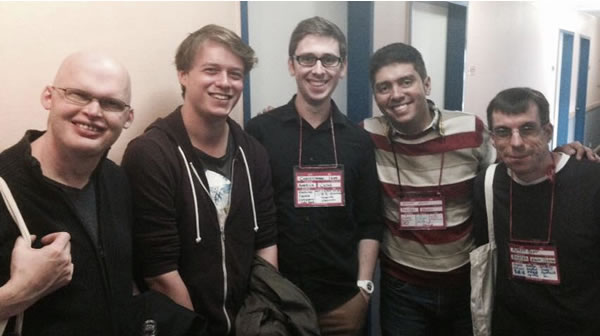
Some of the polyglots at the Polyglot Gathering – from right to left: Richard Simcott, Alex Rawlings, Christopher Huff, Jimmy Melo, and me – between us we speak at least 20 or 30 languages, to varying degrees.
The evening activities included a polyglot games evening, an international culinary festival – I took some Welsh cakes and bara brith, which were popular – a book fair, a polyglot game show, a concert with the multilingual French singer JoMo, who sang in 25 different languages, and an international cultural evening, at which I sang a Scottish Gaelic waulking song (Ceud soiridh soiridh bhuam) and one of my own songs – A Hen in My Hat (in 5 languages). After the cultural evening there was a little Irish and Scottish music session – I had a couple of tin whistles with me, and a few other people had instruments.
So now I’m back in Bangor and will start to catch up with the work I couldn’t do while away due to time constraints and internet connection issues.
Les mots de la semaine
| français | English | Cymraeg |
|---|---|---|
| ADN (L’acide désoxyribonucléique) | DNA (Deoxyribonucleic acid) | DNA (asid deocsiriboniwcleig) |
| la salive | saliva | poer |
| roux; roquin | red-haired | pengoch |
| noisette | hazel (eye colour) | gwinau; brown golau |
| l’œil au beurre noir; l’œil poché | black eye | llygad du |
| aux yeux troubles | bleary-eyed | â llygaid molog/molglafaidd |